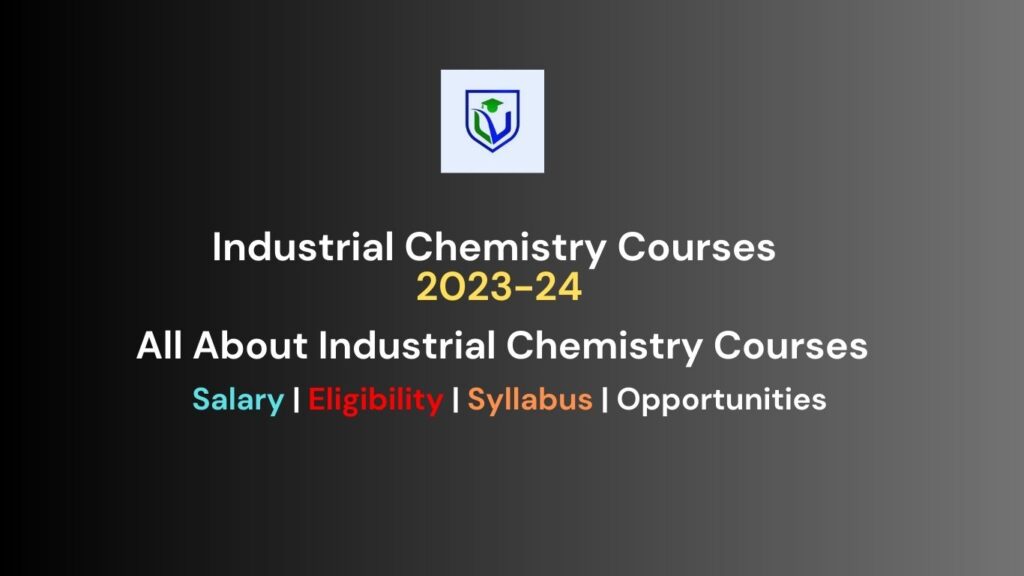Industrial chemistry is the branch of chemistry that applies “chemical principles” and techniques to the development, production and analysis of chemicals, materials and products used in various industries.
It involves the study of chemical processes, materials and their properties and the optimization of these processes to improve the efficiency, cost-effectiveness and environmental sustainability of industrial operations.
Industrial chemists work in a variety of locations, including manufacturing facilities, research and development laboratories, and government agencies. They may be involved in research and development, quality control, process optimization or regulatory compliance, depending on their specialty.
Table of Contents
(IIT) Delhi – B.Tech in Chemical Engineering with specialization in Industrial Chemistry
A highly regarded curriculum that gives students a solid foundation in chemical engineering principles and how they are applied in industrial settings is the B.Tech in Chemical Engineering with a focus in Industrial Chemistry programmed at IIT Delhi.
The curriculum offers classes in process design and optimization, chemical reaction engineering, organic and inorganic chemistry, and other topics. Also, students have the chance to acquire practical experience through laboratory work and workplace training.
Read More: Top Prompt Engineering Courses In India
Best Career Solution in Industrial Chemistry
Industrial chemistry may be a very fulfilling and complex career, with a variety of work options in many different industries. Here are some of the potential industrial chemical career paths:
Process chemist: These chemists design and improve chemical procedures for mass production of goods. They strive to make operations more effective, cut costs, and have a minimal negative environmental impact.
Analytical chemist: To verify that chemical substances and products adhere to quality and safety standards, analytical chemists examine and analyse them. To recognise and measure chemical components, they employ a variety of analytical techniques, including chromatography and spectroscopy.
Materials scientist: Materials scientists research the composition and structure of materials and create new ones for use in manufacturing. They might work on creating novel composites, metals, ceramics, or polymers.
Quality control chemist: By performing tests and inspections throughout the manufacturing process, quality control chemists guarantee that products fulfil quality standards. Also, they look into any problems with the quality and create fixes to avoid them in the future.
Environmental chemist: Environmental chemists create and put into practise solutions for environmental issues including water and air pollution. They might work for public or private organisations.
Bachelor of Technology Industrial chemistry Syllabus
The university or organisation that offers the programme may have a different curriculum for a BTech in Industrial Chemistry. Here is a general breakdown of the subjects and classes that could be in the curriculum, though:
| Year | Subjects |
| First Year | Mathematics Physics Chemistry Engineering Drawing Engineering Mechanics Computer Programming Engineering Materials Environmental Studies |
| Second Year | Organic Chemistry Physical Chemistry Inorganic Chemistry Process Calculations Mass Transfer Operations Fluid Mechanics Thermodynamics Engineering Economics |
| Third Year | Chemical Reaction Engineering Chemical Process Technology Instrumental Analysis Chemical Process Control Chemical Plant Design and Economics Materials Science Chemical Engineering Thermodynamics Polymer Science and Technology |
| Fourth Year | Environmental Pollution and Control Biochemical Engineering Food Technology and Bioprocess Engineering Petroleum Refining and Petrochemicals Industrial Waste Treatment and Management Safety and Hazards in Chemical Industries Industrial Training and Project |
Read More: Top Preparation Tips for Artificial Intelligence and Machine Learning
BTech Industrial chemistry Top Entrance Exams
Depending on the university or organisation offering the degree, different entrance tests may be needed for admission to a BTech in Industrial Chemistry programme. The main entry tests for a BTech in industrial chemistry in India are listed below, though:
| Entrance Exam | Description |
| Joint Entrance Examination (JEE Main) | This is a nationwide entrance exam for a variety of engineering and technology programmes given by colleges and universities all over India, and it is administered by the National Testing Agency (NTA). |
| Birla Institute of Technology and Science Admission Test (BITSAT) | For admission to its engineering programmes, including the BTech in Chemical Engineering programme, BITS Pilani administers a computer-based entrance exam. |
| Vellore Institute of Technology Engineering Entrance Exam (VITEEE) | For admission to its several engineering programmes, including the BTech in Chemical Engineering programme, VIT University administers this university-level entrance exam. |
| Manipal University Online Entrance Test (MU OET) | For admission to its engineering programmes, which include the BTech in Chemical Engineering programme, Manipal University administers an online entrance exam. |
| SRM Joint Engineering Entrance Exam (SRMJEEE) | For admission to its engineering programmes, which include the BTech in Chemical Engineering programme, SRM University administers this university-level entrance exam. |
Industrial Chemistry Salary
The degree of education, job title, industry, and location are just a few examples of the variables that might affect salaries in industrial chemistry. The following are some approximations of compensation ranges for several industrial chemistry positions in the US:
| Designation | Salary |
| Process chemist | $60,000 to $120,000 per year |
| Analytical chemist | $50,000 to $110,000 per year |
| Materials scientist | $60,000 to $140,000 per year |
| Quality control chemist | $50,000 to $100,000 per year |
| Environmental chemist | $45,000 to $110,000 per year |
| Regulatory affairs specialist | $60,000 to $150,000 per year |
Related Post:
-
Top Popular B Tech (बी टेक)Branches in India | Overview B Tech all Branches

Almost everyone knows about Engineering, making it a highly popular career choice after completing 10+2. Students who have studied Physics, Chemistry, Mathematics, or included Biology can pursue a career in…
-
Chemical Engineering Courses
What is Chemical Engineering? Chemical Engineering is all about using chemistry, physics, math, biology, and economics to wisely use, design, move, make, and change energy and stuff. It’s like connecting…
-
NEET PG 2023 Counselling, Syllabus, Eligibility, Criteria in Maharashtra
What is NEET PG 2023? In the ever-evolving realm of medical education, NEET PG 2023 stands as a pivotal milestone for Indian medical students aspiring to advance their careers. If…
Frequently Asked Question
Q. What is the scope of industrial chemistry?
Ans: Industrial chemistry works on chemical plants and laboratory across the world. In India industrial chemistry is very demanding field Industrial chemistry is build paint and coating etc.
Q. What are the 5 most common industrial chemicals?
Ans: Best Five of the most common industrial chemicals include sulphuric acid, sodium hydroxide, nitrogen, propylene and ethylene etc.
Q. What is the scope of Chemical Technology course?
Ans: Chemical Technology offers best opportunities in industries like pharmaceuticals, petrochemicals, and materials, driving innovation and sustainable advancements.
Q. What is a chemical engineer salary?
Ans: So we are basically india provide best salary for chemical engineers this is basic structure.
The average chemical engineer salary in India is Rs 8L per year.

